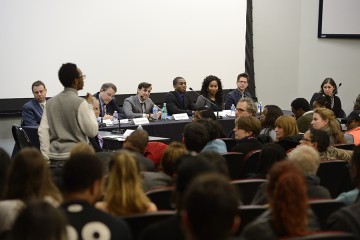Three days after Johns Hopkins University's Black Student Union hosted a discussion on issues of race and diversity on campus, JHU President Ronald J. Daniels authored an op-ed in The Johns Hopkins News-Letter, the student newspaper, in which he described some of the ways university administrators are already responding to concerns raised by the students and outlined next steps.
The full text of Daniels' article is below:
On Monday evening, the Black Student Union called the campus community together for a frank conversation concerning issues of race, diversity and the black student experience at Johns Hopkins, drawing an overflowing auditorium of students, faculty, staff and alumni.
It was an important moment, not only because of the issues raised and discussed, but also because of the shared recognition of the depth and the persistence of the challenges before us.
BSU President Matt Brown opened the forum with a history of the BSU and its interactions with successive university administrations over the last half-century. He emphasized the striking similarity in concerns and aspirations expressed by the BSU over this period.
Like Matt, I recently immersed myself in the history of the BSU and of our university's past efforts to respond to the issues raised by our black students, faculty and staff. It is clear that our record is mixed, with meaningful progress in some areas but far too little in others—particularly in relation to the recruitment and retention of black faculty.
Across more than two hours of thoughtful, and at times intense, discussion we touched on issues ranging from faculty diversity, to student retention, to concerns about racism and harassment on our campuses. I described some of the ways we are responding, including the Faculty Diversity Initiative; the efforts we have mounted in relation to the recruitment and retention of black students; the recruitment of a cluster of new faculty in Africana studies; a plan to develop trainings to foster cross-cultural understanding among students, faculty and staff; and efforts to augment the university's response to racial harassment.
As a critical next step, we will memorialize these commitments in a document that will be shared with the community before the start of the spring semester. This document will include a clear timeline of activities, which the BSU has fairly requested, so we can mark our progress and hold ourselves accountable. It will stand as a dynamic blueprint, evolving as appropriate in light of community input and our actual performance.
On behalf of our entire university community, I want to extend my thanks to the BSU's members, leaders and faculty advisor Dr. Katrina McDonald and to forum moderator Dr. Mieka Smart, for their committed and proactive efforts to frame and advance this discussion.
Our university has long been committed to the view that diversity—of thought, people and human experience—is central to our education, research and service missions. But we also know and must acknowledge the gap that exists—often in plain view—between the actual state of our university and the fulfillment of this ideal. Our task is to have the courage and the tenacity to confront these realities, to probe, debate and understand their source, and to make the sometimes hard changes necessary to ensure Johns Hopkins becomes an even better place.
Posted in University News, Voices+Opinion
Tagged diversity










